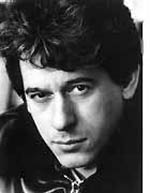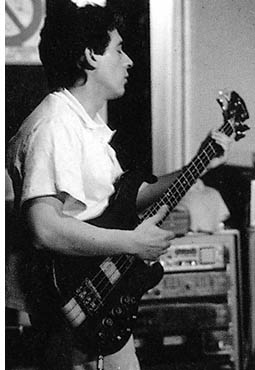Home
 Interviews
Interviews
 Davide
Romni
Davide
Romni
An
interview with Davide Romani
By Francis Depuydt, Patrik Andersson
and Paolo Caroselli
 Francis:
Did you enjoy the live gigs you did with the Change? Would
you have liked to tour with the Change as an official member
of the band or did Petrus never ask it to you?
Francis:
Did you enjoy the live gigs you did with the Change? Would
you have liked to tour with the Change as an official member
of the band or did Petrus never ask it to you?
Davide:
At that time it was more important to use up my energy
writing songs only. Anyway I should not have been touring
at that time since I had just got married and a baby was born.
Nonetheless I have spent a long time in N.Y. to assemble the
band and lead them through preparation, rehearsals, etc.
Francis:
Did you listen to soul music or R&B at the time? Did you like
the productions of Leon Sylvers, Randy Muller, Mtume & Lucas,
Narada Michael Walden or Eumir Deodato?
Davide:
Yes, I still listen to a lot of music.
Francis:
Who owns the rights of the Change group today? Any news about
a new Change project?
Davide:
I'd rather leave this question unanswered. There's a lot of
confusion, but we are working in order to set things straight.
Some singers and players who had lent their talents to the
group in the past have been doing public appearances under
the name "Ch'ange". Unbelievable!
Francis: Do you think you can talk EMI/Capitol executives
into releasing the original BB&Q Band LPs on CD?
Davide:
Surely the whole catalogue will be re-released.
Francis:
Are there any master-tapes with unheard tracks from the 80's
recordings of Change, High Fashion, BB&Q Band, Peter Jacques
Band forgotten anywhere on the shelves of record companies?
Davide:
I wouldn't know what to say.
Patrik:
Building up a production company such as Goody Music (later
Little Macho) did cost a lot of money indeed. How were Petrus
and Malavasi able to finance their new born business back
in 78?
Davide:
Well, it was a hit after hit starting from "Macho" and money
began pouring in.
Patrik:
It has been said that financial management was the reason
for the bankruptcy of Goody Music. What do you know about
the real reason behind it and how did that affect record production
as well as personal relationship among you, Petrus and Malavasi?
 Davide:
Petrus was a nice chap, but at times a bit mischievous. I
say no more!
Davide:
Petrus was a nice chap, but at times a bit mischievous. I
say no more!
Patrik:
Lerroy Burgess, Jeff Bova and a few others say more or less
that Petrus got in touch with the mafia, perhaps in New York.
Do you know anything about it?
Davide:
As far as I know, I do not believe it's true. The real problems
occurred when he came back to Guadeloupe.
Patrik:
What were your feelings in general about the music in 77,
when you were hooked up with Goody? What did you listen to
at the time and what artists inspired you?
Davide:
Well, at that time I would listen to Chick Corea, Stanley
Clark and contemporary musicians who had a new way of playing
jazz only. Anyway I also liked the pop music by Gino Vannelli.
Patrik:
Where did you have your main office in Italy the first
years? Where there several Goody music shops that sold records
in Italy or just one?
Davide:
The stores were in Milan for sure, but all we musicians had
nothing to do with Petrus's record shops.
Patrik:
How important were DJ's, clubs and radio stations to Goody
Music in order to find airtime for the first albums released
in '78 and '79?
Davide:
Obviously, they were very important. What else
could I say?
Patrik:
You two penned several hit songs. Was the writing process
a solo job or would you and Malavasi share ideas most times
in a common creative effort?
Davide:
We used to collaborate in both senses but let's say that I
was much more involved in the making of the rhythmics whereas
Malavasi used to give his finishing touch.
Patrik:
When did Petrus reach Italy from Guadalupe? Did he come on
his own or with his parents? According to an interview made
in '79 he had been living in Italy since '69. What were his
Italian, French and English like?
Davide:
I met Petrus for the first time in Italy. At that time he
was with his brother Alex who helped him for a long time even
after he had gone back to Guadeloupe. Petrus trusted his brother
very much. On the contrary I met his mother only a couple
of years ago in Guadeloupe.
Patrik:
Change was an overwhelming success. What thoughts crossed
your mind in '80?
Davide:
As I have already said in your previous interview, it was
a great creative moment and anything went "with the hole"
as we use to say in Italy when anything goes very well.
Patrik:
As I see it, music is something that connects this world with
a spiritual one, an extremely powerful source. What's your
thought about that? How does music affect and nourish your
life?
Davide:
It is something mysterious that gives force and hope especially
to those who can perform it.
Paolo:
In the light of your manifold professional experiences, how
do you reckon your experience as a "dance" composer and musician?
A "journey accident" or a "basic stage" in your professional
career? Do you regret that experience or are you proud of
it?
Davide:
I don't regret anything I did. Obviously, one grows up and
not always in a good way. At the moment I am mad about Brazilian
jazz. What do you think about it?
Paolo:
Could you please give your opinion about today's and '70s/'80s
dance music? Which are the similarities and the differences
between them from all points of view?
Davide:
I have had a chance to listen to some really excellent
dance music with highly refined sonorities. On the contrary,
I find some other productions absurd without noteworthy musical
contents.
Paolo:
In your opinion, is there a particular reason why many '70s/'80s
disco/dance songs are well known and whistled to today, as
they were in the past, whereas contemporary dance hits are
hardly remembered even after a couple of years since their
release?
Davide:
I think that we have to wait at least twenty years to know
whether contemporary hits will be still popular. Anyway, I
think only a few people will remember these songs.
Paolo:
Does the regular release of countless cover versions (by Alcazar,
Tom Jones, Janet Jackson, etc.) of '70s/'80s disco/dance songs
depend on the poor creative vein of current musicians/producers
and their inability to renew their style or maybe on the typical
record industry cut-throat competition?
Davide:
No, it depends on the lack of smash songs and great rhythm
tunes, belonging to an age of new and younger producers without
a long term musical experience. Never forget that those songs
were played by real musicians and not by digital samplers
or plastic basses. Come on, have you ever noticed that after
all those years the productions of the '80s still sound great,
especially on vinyl? Last, let me point out that in those
days music was performed by musicians who were really capable
of doing it.
Paolo:
One day you turn on the radio and Janet Jackson is moaning:
"ALL FOR YOUUUU", on an amazing and involving musical background.
The sampler of "The glow of love". What did you think at that
very moment: 1) what a terrible sound; b) music could be better;
c) this tune is not bad at all; d) the one who wrote the music
to this song is a great guy for sure.
Davide:
Well, I immediately recognized the sampled music background,
because it was just like the original one. Anyway, for a start
I never thought that song (editor's note: "The glow of love")
might be a smash hit. Luckily, I was wrong.
Paolo:
Out of the blues, could you list your personal all-time "Top
Ten Disco Chart" for us?
Davide:
It is not that simple, because it requires a lot of time.
Paolo:
Listening to all the "musical rubbish" currently being
played on radios and in discotheques, have you ever thought
to come back and play dance music? Maybe together with some
(or all) of your old fellow-travellers? What would they think
about it?
Davide:
It seems to me that now musicians need be backed up by a D.J.
to perform that kind of music. Anyway, not all the D.J.s are
good at doing it, so it's better to leave them doing all by
themselves.
Paolo:
Have you ever noticed that the start-tune of the song
"Change of heart" and its sound are quite similar to the song
"Just be good to me" performed by the S.O.S. Band? Nevertheless,
that song is very beautiful in my opinion.
Davide:
Have you ever noticed that the basic melody is exactly the
same as in the song "Paradise"?
 Italian
version
Italian
version
Many
thanks to Mr Romani for his open minded attitude through out
the interview.
Special
thanks to Paolo Caroselli for the translation and to Yves
Le Page for the second picture.
INTERVIEW
BY FRANCIS DEPUYDT, PATRIK ANDERSSON AND PAOLO CAROSELLI,
MAY 2005